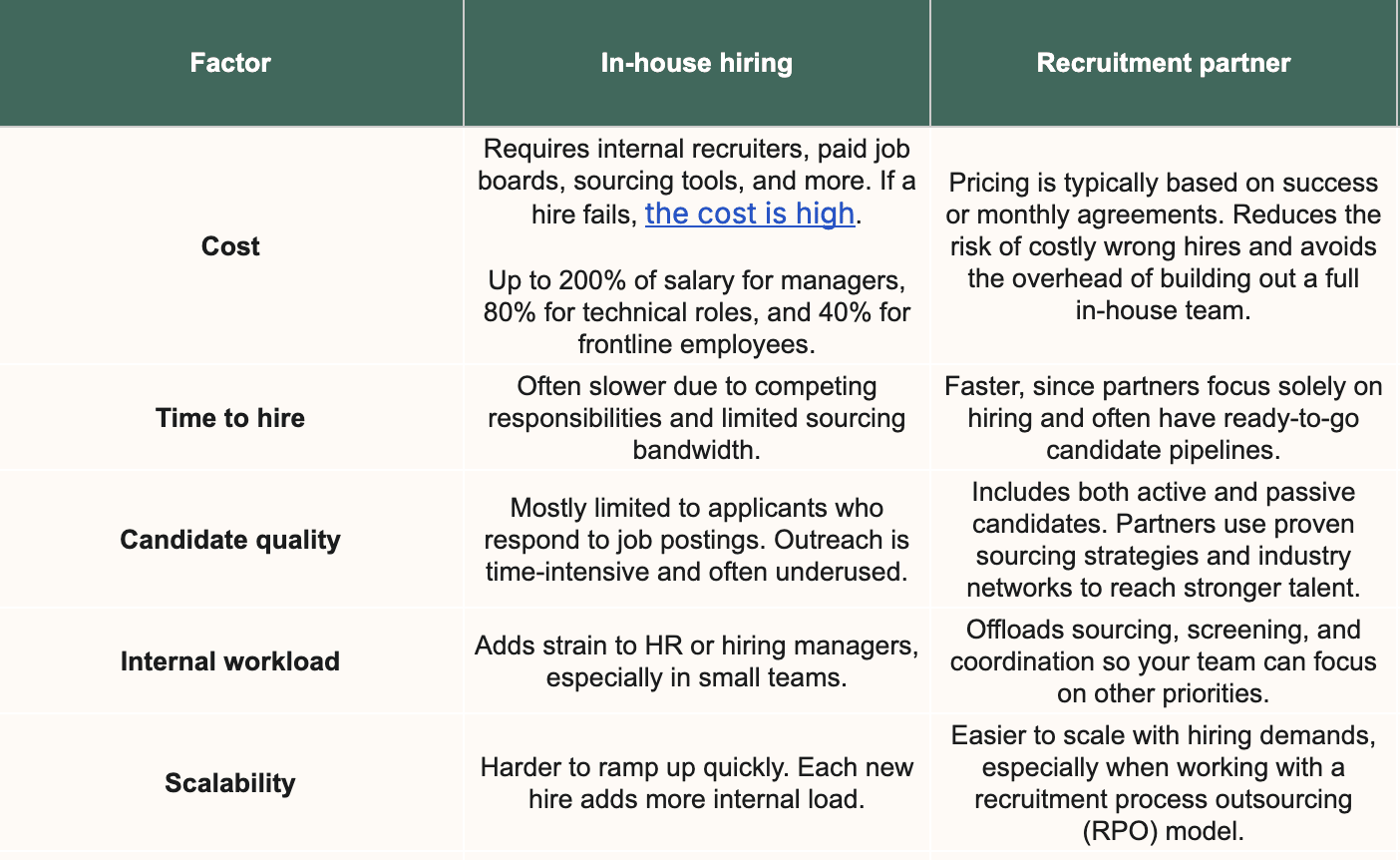Key Takeaways
- A recruitment partner helps businesses hire faster by reducing delays, easing internal pressure, and improving candidate fit and quality for critical roles.
- Recruitment partners manage the full hiring process from role definition to onboarding, allowing your team to stay focused on growth.
- Compared to in-house hiring and staffing agencies, recruitment partners offer more flexibility, better candidate networks, and faster results.
Hiring isn’t like buying a new software license or swapping out a vendor. You're bringing in a person. This is someone who can either elevate your team or create costly setbacks if the fit isn't right. And in a tight labor market, that gamble is even riskier.
For startups and growing companies, hiring quickly without sacrificing quality has never been harder. Roles are staying open longer, the cost of recruitment keeps climbing, and internal teams are often stretched thin trying to keep up.
Given today’s hiring challenges, the right recruitment partner can make a real difference. In this guide, we’ll break down what a recruitment partner does, how they support your business, why you should use one, and what to look for.
What Is a Recruitment Partner?
Recruitment partners work alongside your team to understand your hiring goals, build a strategy around them, and deliver candidates who are ready to make an impact. Unlike traditional recruiters who focus on filling roles fast or job boards that leave you sorting through a pile of unqualified applicants, recruitment partners are involved from the start.
They help clarify what you're really looking for, offer advice on job descriptions and compensation benchmarks, and actively source candidates who strongly match your needs. They also manage communication with candidates, guide you through the interview process, and help close the offer.
The best recruitment companies operate like embedded partners rather than third-party vendors. That difference means better alignment, faster hiring decisions, and a far better chance of making the right hire the first time.
If you’re scaling or need to make a critical hire, a recruitment partner brings the recruitment strategy and support to do it right.
What Services Does a Recruitment Partner Provide?
Hiring is expensive and incredibly time-consuming. The average cost per hire in the US is now over $4,700, and 41% of HR professionals say they spend most of their week buried in admin. According to a Gartner study, less than 10% of HR departments are actually achieving results.
That’s why many companies turn to recruitment firms. Instead of needing to handle dozens of disconnected tasks, you get a streamlined recruiting process managed by someone who knows how to hire well and move quickly. Here's what that includes:
- Role scoping and definition: Refining job requirements, salary benchmarks, and must-have skills.
- Active and passive sourcing: Finding candidates through job ads and outreach, not just whoever applies, significantly expanding the candidate pool.
- Vetting and in-depth screening: Reviewing resumes, doing reference checks, running initial interviews, and filtering out mismatches.
- Interview coordination: Scheduling, managing feedback loops, and keeping communication clear.
- Management and onboarding support: Helping secure the hire and supporting their start.
- Optional compliance and contracts: Handling international hiring requirements and contract negotiations.
If you’re building a distributed team, outsourcing recruitment services can also help you navigate payroll, contracts, and compliance across borders.

7 Reasons to Work with a Recruitment Partner
Working with a recruitment partner isn’t just a fallback when hiring gets tough. For many companies, it’s a strategic move to save time, improve outcomes, and protect internal bandwidth. Here are seven scenarios where a partner makes a real difference—and how it’s helping businesses hire smarter.
1. Hiring is taking too long
The average time-to-fill in the US has stretched to 47.5 days. That’s nearly seven weeks of lost productivity for every open role. In fast-moving industries or lean teams, that delay can impact deliverables, force existing staff to cover extra work they may not be trained to do, or increase burnout. (Nearly 80% of HR leaders expect employee burnout to remain high or rise in 2025.)
Recruitment partners move faster because they’re focused solely on hiring. They bring in qualified candidates early, reduce interview bottlenecks, and manage the process from outreach to offer so your team can hire in weeks, not months.
2. Internal HR teams are overloaded
HR teams aren’t just managing hiring. They’re also handling onboarding, payroll, employee relations, and compliance.
A recruitment partner takes sourcing, screening, and scheduling off your internal team’s plate. That frees up your staff to focus on high-priority tasks like shaping company culture and improving employee experience. With a recruitment company, all of these can be accomplished while the hiring process moves forward.
3. You’re hiring for hard-to-fill or specialized roles
Roles requiring technical expertise or niche skill sets are tough to fill. Recent surveys from SHRM indicate that 58% of HR professionals said their top hiring challenge was a lack of qualified candidates. Recruitment partners are especially useful here because they often specialize in specific industries.
They know where to find talent that doesn’t show up through job boards, and they can pitch your opportunity in a way that resonates with potential candidates.
4. You want access to passive candidates
Most qualified professionals aren’t actively applying to jobs, but they’re open to the right opportunity. One study found that 71% of workers are open to new roles, and another found that 93% plan to look in 2025.
Job posts won’t reach these talented professionals, but recruitment partners will. They proactively reach out to passive talent, build interest in your company, and nurture those relationships until the timing is right. That means you get a larger, higher-quality talent pool that competitors may never see.
5. You’ve had a few bad hires and can’t afford more
Bad hires cost money, slow down teams, hurt morale, and lead to repeat hiring. Recruitment partners reduce that risk by thoroughly screening candidates in the early stages. They vet for both skill and company culture fit, align expectations clearly with the candidate, and help you spot red flags you might miss on your own.
When the screening is stronger upfront, retention tends to be higher. This means you won’t end up hiring again six months later.
6. You want to hire outside the US
Hiring globally can save money, expand your talent options, and reduce time to fill—if you know how to navigate the logistics.
According to Remote.com:
- 73% of remote-first companies are already hiring internationally.
- 31% have lowered costs by doing so.
- But 43% report major compliance challenges.
Given these statistics, many companies use recruitment partners with global experience. The best remote recruitment agencies help businesses access talent across borders while staying compliant.
It’s worth reviewing recruitment process outsourcing costs to understand how pricing works for cross-border hiring.
7. Job boards aren’t cutting it anymore
You’ve probably posted a job, waited two weeks, and still haven’t seen any qualified applicants. That’s because job boards are reactive. In today’s hiring market, that approach isn’t enough.
A recruitment partner builds a proactive hiring strategy. Instead of waiting, they go out and find the right people, make the case for your role, and find you the best talent available. That’s how you stay competitive, especially when everyone is hiring from the same limited talent pool.
Recruitment Partner vs. In-House Hiring: What's the Difference?
Recruitment can be handled in different ways, where the talent acquisition and recruitment model you choose affects everything from hiring speed to long-term success. Here’s how in-house hiring compares to working with a recruitment partner:

How to Choose the Right Recruitment Partner for Your Business
Not every recruitment partner will be the right fit for your business. If you want to make better hires faster, it’s worth asking potential partners the right questions upfront. Here’s what to look for when evaluating your options:
- Industry experience: Look for partners who’ve hired for roles similar to yours. Deep industry knowledge and experience help them understand your expectations, avoid mismatches, and move with confidence.
- Candidate sourcing strategy: Ask whether they rely mostly on inbound applicants or if they actively reach out to passive candidates. Firms with strong networks tend to deliver stronger shortlists.
- Pricing transparency: A good partner should be clear about how they charge. This could be success fees, flat rates, or monthly retainers. Hidden fees or vague terms are a red flag.
- Communication and responsiveness: You’ll want regular updates and a direct point of contact. Fast, consistent communication helps avoid delays and misalignment during the process.
- Metrics and guarantees: What happens if a hire doesn’t work out? Many partners offer replacement guarantees and track retention rates as part of their quality standards.
And if you're a startup, a recruitment company that focuses on early-stage hiring needs can provide extra support around scaling quickly and hiring for new roles.

Common Misconceptions About Working with a Recruitment Partner
It’s common to have concerns about working with a recruitment partner, especially if you've had mixed results before. But many of these objections are based on outdated assumptions.
“It’s too expensive.”
As already discussed, the cost of hiring is high, and that’s even before factoring in time, productivity loss, or failed interviews. A recruitment partner helps you make the most of your hiring budget by improving quality and reducing wasted effort.
“We don’t hire enough to justify it.”
You don’t need dozens of open roles to benefit. Even one key hire can impact your business significantly. When the stakes are high, it’s worth having the right support to get it right the first time.
“We had a bad experience before.”
Not all firms work the same way. A recruitment partner acts as a strategic collaborator, not a volume-based vendor.
If you’ve worked with a staffing agency in the past, it may be worth exploring recruitment process outsourcing (RPO) firms. These firms differ from staffing firms in that they focus on long-term hiring success rather than just short-term placements.
“We’ll just post on LinkedIn ourselves.”
Promoted ads on LinkedIn often cost $5 to $10 per click. With over a billion users, the costs add up fast, and you still might not reach qualified candidates. Recruitment partners take a more focused, strategic approach to save you both time and money in the process.
Final Thoughts
Hiring doesn’t need to be slow, expensive, or unpredictable. A recruitment partner helps you move faster, reduce internal strain, and reach better candidates. This is especially important when you’re hiring for hard-to-fill or niche roles or expanding outside the US.
Near helps growing teams tap into top talent across Latin America, providing cost-effective support, time zone alignment, and faster results without sacrificing quality.
Need to hire fast without compromising quality? Fill out this form so we can better understand your needs. You’ll get matched with vetted candidates ready to go in 21 days.











.webp)
.webp)


.png)






%20(1).png)
%20(1).png)
